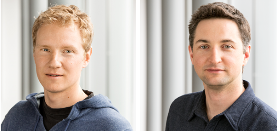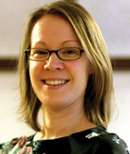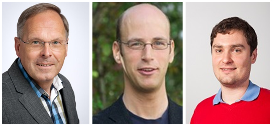REASON Winter School 2019 Workshops
We are very happy to announce the four workshops at the REASON Winter School 2019:
- Arguing with and about evidence - exploring two sides of evidence-based argumentation, Andreas Hetmanek and Maximilian Knogler (Technische Universität München) details...
- Analysing and theorising mechanisms of change towards evidence-based dialogue and practice, Riikka Hofmann (University of Cambridge) details...
- Teachers’ use of scientific evidence based on a nation-wide project, Konrad Krainer (Alpen-Adria-Universität Klagenfurt), Stefan Ufer (Ludwig-Maximilians-Universität München) and Andras Csanadi (UniBW München) details...
- Meta analyses as evidence generation and evidence evaluation methods, Karsten Stegmann (Ludwig-Maximilians-Universität München) details...
 Arguing with and about evidence - exploring two sides of evidence-based argumentation
Arguing with and about evidence - exploring two sides of evidence-based argumentation
Andreas Hetmanek (Technische Universität München)
Maximilian Knogler (Technische Universität München)
Monday 18.02.2019, 13:00-15:30, Seminar Room 140 (1st floor)
Before we start talking about evidence-based argumentation a crucial question needs to be addressed: Is there reliable and relevant evidence concerning a specific issue at hand? Only with a substantial research base can we start thinking about arguing with evidence in a specific context or debate.
To answer this fundamental question, throughout the workshop we use the example of effective teaching in STEM education with secondary populations. We then explore ways of communicating this evidence base into practice along the case of the Clearing House Unterricht project. Thereby we will also touch upon the so-called “prescriptive statements debate” and discuss the contribution that empirical research can make to the discourse about the design of education.
During the workshop participants are introduced to the exploration of an evidence database in a particular area of interest, gain insights about ways to transfer evidence into practice and reflect theoretical / methodological concerns about argumentation at the edge between research and practice.
Short Bios:
Andreas Hetmanek received his doctoral degree at the Ludwig-Maximilians-Universität München. He is now working at the Technical University of Munich. He is part of the research team of the Clearing House Unterricht project and is in charge of setting up a research database as well the dissemination of research syntheses in the field of teacher education. His research interests comprise the development of open science standards for an increase in transparency and replicability in research on teaching and learning. In his research he employs a wide range of methodologies including qualitative interviews and experimental designs, as well as meta-analytical approaches.
Maximilian Knogler is a post-doctoral researcher in the lab of Prof. Tina Seidel at the TUM School of Education. He coordinates the first Clearing House Unterricht project with a focus on effective teaching and learning to strengthen evidence-based teacher education. In his research, he uses intervention studies, design-based approaches und research syntheses to identify effective factors and designs for supporting students’ motivation and learning. His work connects research with the development of innovative and evidence-based learning environments for students and teachers (for example Planspiel Energetingen). Maximilian Knogler graduated from the University of Munich and the University College Dublin with a degree in School Psychology and English. After finishing his Ph.D. with excellence at the TUM School of Education, he spent a semester in the lab of Prof. Judith Harackiewicz in the Psychology Department of the University of Wisconsin-Madison. For his work in research and development he received several awards (e.g. EARLI, AERA, ISAGA).
 Analysing and theorising mechanisms of change towards evidence-based dialogue and practice
Analysing and theorising mechanisms of change towards evidence-based dialogue and practice
Riikka Hofmann (University of Cambridge)
Wednesday 20.02.2019, 9:15-12:00, Seminar Room 140
Research has demonstrated that guidelines and professional development programmes aimed at improving evidence-based reasoning and practice in educational and healthcare settings often fail to translate to change in professional practice. Moreover, research has shown that interventions are often implemented in a superficial way with apparently visible modifications to practice post-intervention failing to lead to genuine transformation. Quasi-experimental designs tell us about interventions’ capacity to impact change, but say little about how change happens or what may hinder it.
This workshop focuses on the conceptual and methodological tools from recent research to understand and investigate the mechanisms of, and barriers to, changing professional reasoning and practice, focusing primarily on observational data but drawing on other sources. In the workshop you will discuss recent research findings and have the opportunity to engage hands-on with real data examples. The presentation, discussion and data work will consider the subtle but effective discursive ways of resisting change, and the role norms, accountability and risk play in moving towards evidence-based practice and reasoning, and how we can analytically examine and establish these in our qualitative data sets.
Short Bio: Riikka Hofmann is a University Lecturer in Faculty of Education where she leads the Research Strand “Dialogue, Professional Change and Leadership” in the Faculty’s Cambridge Educational Dialogue Research Group (CEDiR). Her research focuses on leadership and professional change in educational and medical settings, studied from the perspective of sociocultural psychology. She also conducts research on classroom learning and dialogue, having been involved in research in the U.K., Finland and Mexico, as well as in Sub-Saharan Africa, India and Pakistan. Her research utilises a mixed methods approach, drawing both on qualitative approaches, process analyses and evaluation designs. Riikka leads the Research Methods Strand of the Faculty’s MPhil (Masters) programme, and teaches on the Educational Leadership and School improvement Masters route. She also collaborates with the Cambridge Clinical School and the Postgraduate Medical Education Centre at Cambridge University Hospitals as a member of the strategy group of its Simulation Centre. Riikka is an expert member of the U.K. Government’s policy trials expert panel, and advises various Government departments on research methods in policy evaluations as well as advising on leadership development in the civil service Future Leaders Scheme.
 Teachers’ use of scientific evidence based on a nation-wide project
Teachers’ use of scientific evidence based on a nation-wide project
Konrad Krainer (Alpen-Adria-Universität Klagenfurt)
Stefan Ufer (Ludwig-Maximilians-Universität München)
Andras Csanadi (UniBW München)
Monday 18.02.2019, 13:00-15:30, Seminar Room 134 (1st floor)
The workshop focuses on the use of evidence by teachers in practice based on our experiences from the IMST project. IMST is a nation-wide MINDT (German abbreviation for Mathematics, Informatics, Natural Science, German, and Technology) learning and teaching initiative in Austria. It represents a flexible support system primarily financed by the Federal Ministry of Education and consists of scientists accompanying teachers in their endeavours to improve instruction.
Based on examples from the report database of the IMST project, we will discuss the forms of evidence used by teachers and some of the major challenges in using and interpreting evidence. We will also extend on an analysis tool from the REASON program to shed light on the ways teachers apply the knowledge they acquired in a university context as well as different types of evidence when solving educational problems.
Short Bios:
Konrad Krainer has a PhD and a habilitation in mathematics education. He is full professor at the Institute of Instructional and School Development, Alpen-Adria-Universität Klagenfurt. Konrad Krainer does research in mathematics education and teacher education. One major focus is scaling up innovations in mathematics and science teaching. He links teachers' continuous professional development with school development and educational reform and investigates its impact. His largest current project is 'IMST - Innovations Make Schools Top.'
Stefan Ufer is full professor of mathematics education at the Department of Mathematics, Ludwig-Maximilians-Universität in Munich. Stefan Ufer works on skills, problems and learning scientific reasoning in mathematics, but also in their mathematics teachers’ everyday practice. Current projects focus scientific reasoning processes, for example during lesson planning or when diagnosing students’ understanding. His research links studies in prerequisites, processes, and products of scientific reasoning processes with tasks in the everyday practice of mathematics educators and mathematics learners.
Andras Csanadi was part of the first cohort of REASON between 2013-2017. Since 2017 he works in the working group “Learning and Teaching with Digital Media” of Prof. Bernhard Ertl at the Bundeswehr University of Munich. His research interest is computer-supported collaborative learning, evidence-based teaching. He has been focusing on analyzing learning processes in verbal and eye-tracking data.
 Meta analyses as evidence generation and evidence evaluation methods
Meta analyses as evidence generation and evidence evaluation methods
Karsten Stegmann (Ludwig-Maximilians-Universität München)
Wednesday 20.02.2019, 9:15-12:00, Seminar Room 134
Meta analyses have been frequently regarded as appropriate method to derive strong evidence on specific factors and their interaction with moderators. Not each meta analysis, however, provides strong evidence. On the one hand, many older meta analyses applied statistical analyses that – from today’s perspective – are problematic (e.g. overestimating effects). One the other hand, even current meta analyses often are hard to interpret: too heterogenous studies are used to compute integrated effect sizes, control conditions are not adequately specified, correlated effect sizes are ignored, the quasi-experimental nature of meta analyses is ignored.
The workshop will introduce a set of serious pitfalls and demonstrate ways to avoid them. R and RStudio are used to demonstrate and practice specific procedures. RMarkdown is used to document data handling and data analyses. Participants are invited to bring their own data to the workshop.
Short Bio: Karsten Stegmann is post-doc researcher at the Ludwig-Maximilians University (Munich, Germany). His research revolves around instructional support of learning processes with foci on role of digital media and collaborative learning. Thereby he aims to put forward the Script Theory of Guidance as framework that brings together instructional scaffolds, collaborative learning and individual learning processes. To analyze learning processes, he further develops methods to measure learning activities more deeply (quantification of knowledge convergence, sequential analysis) and efficiently (e.g. automatic coding of natural language data). Furthermore, he is conducting systematic syntheses including reviews and meta analyses.

